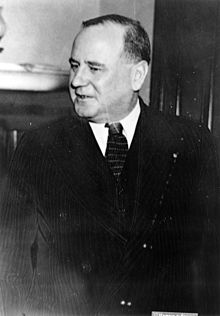Bennett Clark
| Bennett Champ Clark | |
|---|---|
 |
|
|
United States Senator from Missouri |
|
|
In office February 3, 1933 – January 3, 1945 Serving with Roscoe C. Patterson, Harry S. Truman |
|
| Preceded by | Harry B. Hawes |
| Succeeded by | Forrest C. Donnell |
| Court of Appeals for the D. C. Circuit associate judge | |
|
In office 1945 – July 13, 1954 |
|
| Nominated by | Harry S. Truman |
| Preceded by | Thurman Arnold |
| Succeeded by | Walter Maximillian Bastian |
| Personal details | |
| Born |
January 8, 1890 Bowling Green, Missouri |
| Died | July 13, 1954 (aged 64) Gloucester, Massachusetts |
| Resting place | Arlington National Cemetery |
| Nationality | United States |
| Political party | Democratic |
| Alma mater |
University of Missouri George Washington University Law School |
| Occupation | Lawyer |
| Military service | |
| Service/branch | United States Army |
| Years of service | 1917–1919 |
| Rank | Colonel |
| Battles/wars | World War I |
Joel Bennett Clark (January 8, 1890 – July 13, 1954), better known as Bennett Champ Clark, was a Democratic United States Senator from Missouri from 1933 until 1945, and was later a United States federal judge.
Bennett Clark was born into a political family. The son of Champ Clark, who the only Missourian to ever serve as Speaker of the House, and was a prominent Democratic Party leader of the early 20th century, both he and his sister, Genevieve Clark Thomson, would go on to have political careers. Bennett Clark was born in Bowling Green, Missouri.
After graduating with a B.A. from the University of Missouri in Columbia, Missouri in 1912, he earned an LL.B. at George Washington University. He became parliamentarian of the United States House of Representatives from 1913 to 1917. After serving as a colonel in the United States Army during World War I, from 1917 to 1919, Clark began practising law in St. Louis, Missouri.
In the 1932 election, Clark was elected to the United States Senate as a Democrat. Clark entered the Senate after Senator Harry B. Hawes resigned on February 3, 1933, a month before his term was to end. Clark was re-elected in the 1938 election, but lost his bid for renomination in the 1944 election.
...
Wikipedia
